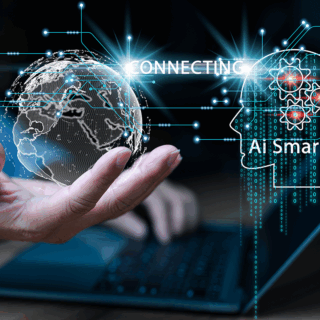
In today’s dynamic business environment, organizations are under constant pressure to adapt and innovate. Artificial Intelligence (AI) has emerged as a transformative force in change management, offering tools that enhance efficiency, stakeholder engagement, and strategic decision-making. As we move through 2025, the integration of AI in change management has become not just advantageous but essential for organizational survival and competitive advantage.
The Current State of AI Adoption in Change Management
Recent studies paint a nuanced picture of AI adoption in change management. While there has been significant growth in AI familiarity among practitioners, actual implementation remains selective. According to updated Prosci research from 2024, familiarity with AI among change practitioners has slightly declined from 84% in 2023 to 77%, yet practical application has decreased further, with only 39% currently using AI in their change management work, down from the 48% reported in the previous year.
This apparent paradox reflects the maturation of understanding around AI applications. Organizations are moving beyond initial enthusiasm to more strategic, targeted implementations. McKinsey‘s 2025 research indicates that 71% of organizations now regularly use generative AI in at least one business function, representing a significant increase from 65% in early 2024.
Quantifiable Benefits and ROI of AI in Change Management
The financial case for AI integration in change management has become increasingly compelling. Organizations implementing AI-driven change management strategies are reporting substantial returns on investment. Recent data shows that generative AI companies are achieving an average 3.7x ROI from their initial investments. More specifically, Deloitte‘s 2024 enterprise study found that almost all organizations report measurable ROI with GenAI in their most advanced initiatives, with 20% reporting ROI exceeding 30%.
The productivity gains are equally impressive. Research from the Federal Reserve Bank of St. Louis indicates that workers using generative AI saved 5.4% of their work hours, translating to a 1.1% productivity increase for the entire workforce. PwC‘s 2025 predictions suggest that organizations making AI intrinsic to their operations are achieving 20% to 30% gains in productivity, speed to market, and revenue through cumulative incremental improvements.
Strategic Implementation of AI Tools in Change Management
Enhanced Communication and Stakeholder Engagement
AI-powered communication platforms have evolved beyond simple message crafting to sophisticated stakeholder engagement systems. These tools now provide real-time sentiment analysis, enabling change managers to adjust their communication strategies dynamically based on audience feedback and emotional responses. Advanced natural language processing capabilities allow for the creation of culturally sensitive, role-specific messaging that resonates with diverse stakeholder groups across global organizations.
Predictive Analytics and Risk Assessment
Modern AI systems offer unprecedented capabilities in predicting change resistance and adoption patterns. By analyzing historical data, communication patterns, and behavioral indicators, these tools can identify potential bottlenecks and resistance points before they become critical issues. This predictive capability allows change managers to proactively address concerns and allocate resources more effectively.
Personalized Learning and Development
AI-driven training platforms now offer hyper-personalized learning experiences that adapt not only to individual learning styles but also to real-time performance data and emotional states. These systems can identify knowledge gaps, recommend targeted interventions, and provide just-in-time support during critical transition phases.
Automated Project Management and Resource Allocation
AI tools are increasingly handling complex project management tasks, from resource allocation optimization to timeline adjustments based on real-time progress data. This automation allows change managers to focus on strategic relationship building and stakeholder engagement while ensuring operational efficiency.
Emerging Trends and Future Applications
The Rise of AI Agents in Change Management
The shift toward agentic AI systems represents the next frontier in change management technology. These sophisticated AI agents can autonomously manage multiple aspects of change initiatives, from monitoring progress against KPIs to initiating corrective actions when deviations are detected. Unlike traditional tools that require human direction, these agents can operate independently while maintaining alignment with strategic objectives.
Integration with Organizational Digital Ecosystems
AI change management tools are increasingly integrated with broader organizational digital ecosystems, including HR information systems, performance management platforms, and enterprise resource planning systems. This integration enables more holistic change management approaches that consider the full spectrum of organizational impacts.
Real-Time Change Pulse Monitoring
Advanced AI systems now provide continuous monitoring of organizational change readiness and adoption rates. These systems aggregate data from multiple sources—including email communications, collaboration platform usage, and performance metrics—to provide real-time insights into change progress and resistance patterns.
Overcoming Implementation Challenges
Despite the compelling benefits, organizations continue to face significant barriers to AI adoption in change management. Recent research identifies key challenges including concerns about data security, uncertainty about implementation methods, and limited access to appropriate tools. However, successful organizations are addressing these challenges through structured approaches:
- Building AI Literacy: Organizations are investing in comprehensive AI education programs for change management teams, moving beyond basic familiarity to practical application skills.
- Establishing Governance Frameworks: Clear policies around data usage, privacy protection, and ethical AI implementation are becoming standard practice among leading organizations.
- Pilot Program Strategies: Rather than enterprise-wide rollouts, successful organizations are implementing AI tools through carefully managed pilot programs that demonstrate value and build organizational confidence.
The Human-AI Collaboration Model
The most successful AI implementations in change management maintain a strong focus on human-AI collaboration rather than replacement. The World Economic Forum‘s latest research suggests that while AI may displace 85 million jobs by 2025, it will create 97 million new roles that leverage the unique strengths of both humans and machines.
In change management, this translates to AI handling data analysis, pattern recognition, and routine communications while humans focus on relationship building, strategic thinking, and complex problem-solving. This collaborative model ensures that the inherently human aspects of change management—empathy, intuition, and cultural sensitivity—remain central to successful transformations.
Practical Solutions for Implementation
As organizations seek to implement AI-driven change management strategies, several platforms are emerging to bridge the gap between theoretical potential and practical application. OrgChange.ai exemplifies this new generation of comprehensive solutions, developed by the experienced Emergent team with decades of organizational development expertise. The platform demonstrates how AI can be practically applied across the full spectrum of change management activities, from organizational strategy and leadership communication to change execution and talent analysis.
What distinguishes effective AI change management platforms is their ability to scale across different organizational contexts—supporting independent consultants working with small businesses as well as Fortune 500 enterprises managing complex transformations. These tools integrate multiple capabilities including AI-driven consulting on organizational structure, data-backed strategies for managing transformation resistance, and real-time stakeholder insights that inform decision-making throughout the change process.
The key to successful implementation lies in platforms that combine sophisticated AI capabilities with practical usability, ensuring that change management professionals can leverage advanced analytics and predictive insights without requiring extensive technical expertise.
Looking Ahead: The Future of AI-Enabled Change Management
As we progress through 2025, the integration of AI in change management is expected to accelerate dramatically. Organizations that have been experimenting with AI are moving toward comprehensive implementation strategies that embed AI capabilities throughout their change management processes.
The focus is shifting from individual tool adoption to creating AI-enabled change management ecosystems that provide seamless, intelligent support throughout the entire transformation lifecycle. This evolution represents not just a technological advancement but a fundamental reimagining of how organizations approach and execute change initiatives.
For change management professionals, the message is clear: AI is not a future consideration but a present necessity. Organizations that successfully integrate AI into their change management practices will be better positioned to navigate the increasingly complex and rapid transformations required in today’s business environment. The question is no longer whether to adopt AI in change management, but how quickly and effectively organizations can make this transition while maintaining the human-centered approach that remains at the heart of successful organizational change.











